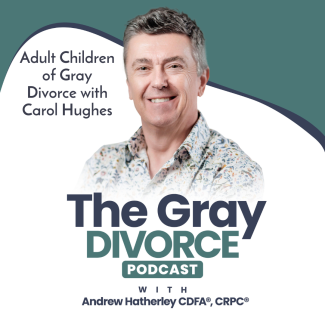
The Gray Divorce Podcast: Episode 16 Adult Children of Gray Divorce with Dr. Carol Hughes
In episode 16 of the Gray Divorce Podcast, I speak with Carol Hughes. Carol is a California-based licensed marriage and family therapist, divorce coach, and mediator. She works with children, adolescents, and adults in her private practice in Laguna Hills. Carol is the co-author of Home Will Never Be the Same Again: A Guide for Adult Children of Gray Divorce.
In this episode, we discuss an area of gray divorce that is often overlooked, the impact of late-life divorce on adult children.
Because the law is so focused on protecting minor children in divorce a myth has emerged that once these children become adults their parents’ divorce has no effect on them. But how can that be? When so many studies have shown that happiness and contentment in life is really the result of the quality of one's relationship with other people, whether they be family, friends, or colleagues. When someone's parents are getting divorced those key relationships can be altered or transformed completely, causing stress and anxiety.
One reason the effect of the parent’s divorce can be more significant for an older adult child is the simple reason that they have had their parents in their life for so much longer. They have become accustomed to their parents playing a particular role in their life over an extended period of time. If an adult child has lived in a world in which their parents were married for 40 years and suddenly that marriage comes to an end the effect can be extremely shocking.
Carol and I discuss the unique issues that apply to adult children of divorce for each developmental stage of adulthood. After all, minor children only remain in that category for 18 years. But the adult child of divorce could be anyone from a college student to a newlywed to a midlife professional to a retired senior citizen.
Younger adult children, for instance, may still be financially and even emotionally dependent on their parents. Many of them may fear that they may have to drop out of college if their parents can no longer afford tuition payments.
Middle-aged adult children may already be feeling the stress of their careers and raising children and now have to face new pressures from their parent’s new life circumstances.
Middle-aged adult children who may be feeling marital pressures of their own may start to question their ability to remain in a long-term relationship. The thinking might be along the lines of “If my parents can't make marriage work, how can I?”
Carol and I also discuss the differing impact of gray divorce on adult female children compared with adult male children.
Carol notes that it often falls on the daughters to try to organize the holidays and family get-togethers, versus the sons. Sons are typically less oriented towards the “social” work and may be less well-equipped to heal damaged relationships.
One key piece of advice that Carol gives to adult children of divorce is to make sure they know that their voice matters. That their feelings matter. There is help, there is hope, there is healing.
All parties should try to heal relationships to the extent that the stains of divorce do not affect all of the family relationships.

